Home › University › How To Write A Personal Statement? 10 Tips + Student Questions Answered › How To End A Personal Statement So The Admissions Committee Remembers You

How To End A Personal Statement So The Admissions Committee Remembers You
- Published January 20, 2023

Table of Contents
Students are often unsure of how to end a personal statement. A strong conclusion makes all the difference in whether your application gets noticed by admissions officers or not.
If you’ve just finished writing your personal statement and you’re stuck on your ending, then don’t worry! This article will walk you through the essentials of personal statement conclusions.
Avoid writing a tedious and forgettable ending for your personal statement by following these rules.
Talk About Your Main Points
Don’t end your final paragraph by stating what you’ve never mentioned in the body of your personal statement. Remember, the purpose of your conclusion is to wrap up the package.
You shouldn’t say, “My experiences kindled my passion for engineering,” if you didn’t mention these “experiences” in the first place!
So actually summarising your key main body points is a great conclusion in many cases.
Summarise Your Key Points In A Simple Way
After reading thousands of personal statements, the admissions committee will be happy to see you concluding your personal statement with a clear summarisation of the vital points.
Go over your personal statement and jot down the main takeaway of each paragraph. Once you have that list, find a way to integrate them into your conclusion.
You can dedicate a sentence to each key point, tie them all together, and you now have a conclusion that does what it’s supposed to do!
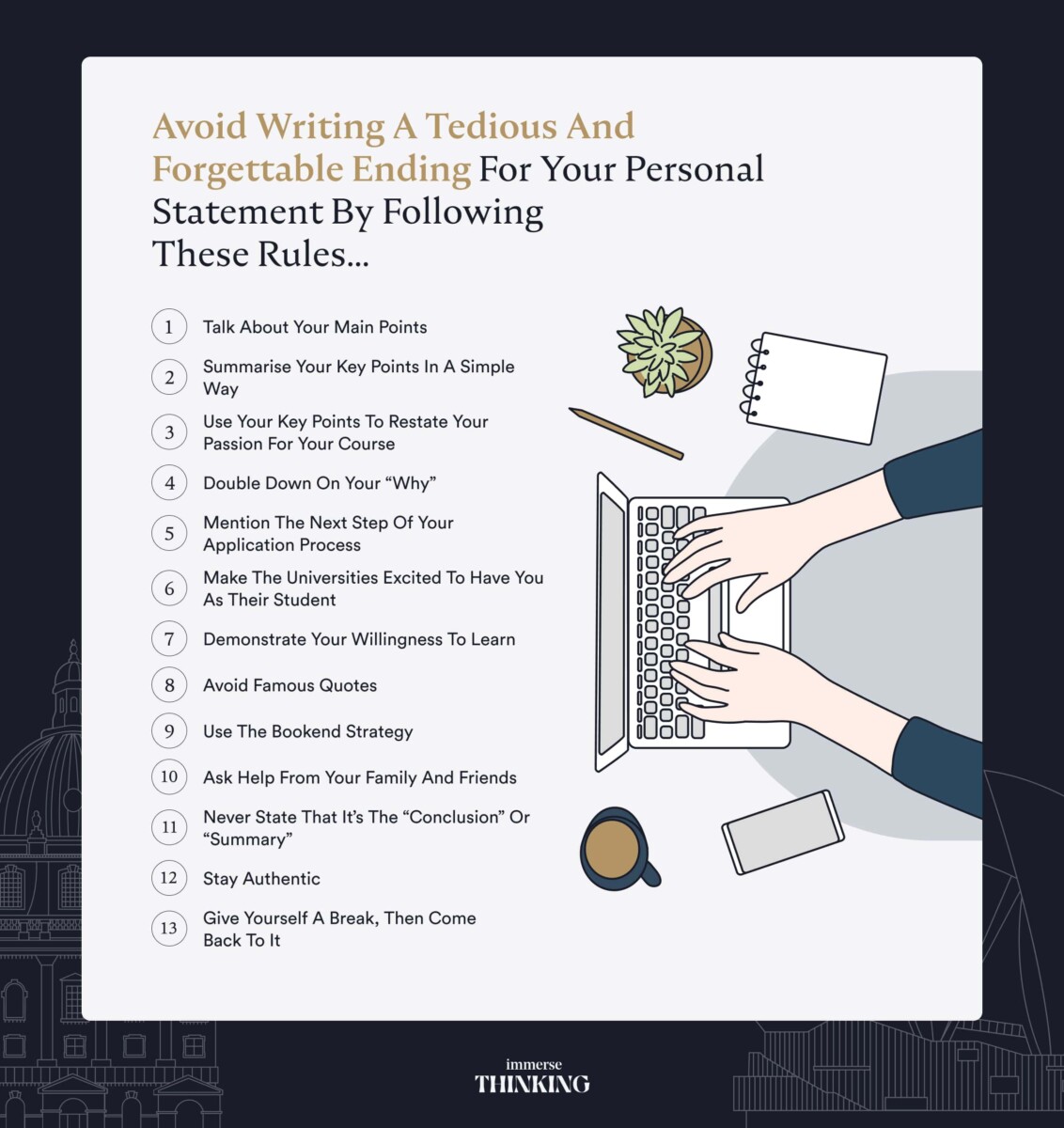
Use Your Key Points To Restate Your Passion For Your Course
If you’re wondering how to end your personal statement using your key points, use them to restate your passion for the course you’re applying for.
Say your key points including your skills and experiences, and wrap them up by saying, “With the [your specific skills] and [your specific experiences] I’ve gained over the years, I’m committed to [mention your course].”
By doing so, you’re hitting two birds with one stone. One, you’re reminding the admissions committee that you have the skill set necessary to succeed in your course. Two, you’re demonstrating your dedication to your desired course.
Double Down On Your “Why”
Another powerful ending is to remind the reader of your “why.” Many students pursue their chosen course because they’re not sure what else to take.
So being clear on your purpose immediately sets you apart from the rest.
To do this, take the most heart-moving story from the body of your personal statement on what inspired you to apply for your course. Mention the main idea of it in a sentence or two, then end with a “for this reason, I believe pursuing [mention course] is the best way to achieve my [state your why].”
If your course is related to education, perhaps your “why” is to help children learn by allowing them to show how they learn best.
Say you’re writing a medical personal statement . Maybe your “why” is to forward technology that helps safeguard the elderly from falling accidents because you witnessed your grandparent suffer injuries from a fall when you were young.
Doubling down on your “why” shows your conviction and direction on why you’re applying for your course.
Mention The Next Step Of Your Application Process
What’s the next step after the admissions committee accepts your personal statement? For many courses, they’ll call you up for an interview . Go ahead and mention this in your conclusion!
Write along the lines of “I’m looking forward to dedicating myself to this course, and I would love to receive an invitation for the interview.”
The reader will right away recognise that you’ve done your research. You know what the next step should be. You are serious about this application!
Make The Universities Excited To Have You As Their Student
Studying at a university is not merely a means to an end. It’s a profound journey in and of itself! You’ll meet new colleagues, form lifelong communities, and discover mentors who will guide you along with your future career.
Think of them when you’re pondering on how to end a personal statement. What can you contribute as a student to make the university a better place? Demonstrate your excitement in meeting them, building relationships with them, and serving them!
A statement as straightforward as “I am eager to establish new, lifelong relationships and use my [mention your skills] to help make the university a better place for learning and community-building.”
Demonstrate Your Willingness To Learn
Universities exist to train and mould students, not the other way around! A little humility goes a long way. Show yours by demonstrating your willingness to learn. Nothing excites teachers more than willing students.
To pull this off, make sure you know what values your course upholds. It could be service, excellence, inclusivity, and so on. State in your conclusion that “I’m looking forward to learning how to embody [write down the course’s values you resonate with], to grow and succeed in [mention your field of study].”
There’s so much value packed in this simple personal statement ending. Tweak it and make it yours!
Avoid Famous Quotes
Many students insert famous quotes from well-known persons when ending their personal statements. Avoid this tactic as much as possible because you’re driving attention away from YOU as the applicant.
If you want to include famous quotes, put them at the beginning of your personal statement to grab attention. To keep your reader’s attention focused on you in the end, why not come up with a memorable, relevant quote of your own?
Use The Bookend Strategy
Bookends are sturdy objects placed at either end of upright books to keep them standing. When you translate that into writing, the bookend strategy is when the introduction and conclusion statements connect to support the body between them.
You may start your personal statement with a heart-wrenching story about how you watched your beloved pet die of the wrong diagnosis. Then, for your conclusion, you can call back on this story and state how this event fuels you to pursue veterinary practice.
The bookend strategy is a clean and efficient way how to end your personal statement.
Ask Help From Your Family And Friends
If you’re still stuck on how to end a personal statement, don’t be afraid to ask for help. Approach your family and friends because they know you more than anyone. Read to them the introduction and body of your personal statement.
Ask them what particular line struck them the most. Maybe they know something about you that you missed including in your personal statement. What characteristics do they see in you that will help you succeed in your course?
Gather their answers in one place, and after reading them in one go, you now have a decent idea of what to emphasise in your conclusion statement.
Never State That It’s The “Conclusion” Or “Summary”
The most boring, generic way to end a personal statement is to write “In conclusion” or “In summary.” It’s actually one of the topics we cover in what not to put in a personal statement .
Avoid this writing style at all costs. A good conclusion statement doesn’t require explicit announcements.
By its style and structure alone, the reader knows immediately they’re about to read a lasting statement. So don’t hesitate to proceed straight to the major points. As long as the conclusion connects seamlessly with the previous paragraph, you’re good to go!
Stay Authentic
Universities hold honesty in high esteem. Show authenticity and honesty in your personal statement beginning with an attention-grabbing introduction to a strong conclusion.
The best way to radiate honesty in your personal statement is to write from the right mindset. When you work on your personal statement, your objective is to show who you are and demonstrate why you are a worthy candidate for the course .
Don’t try to impress. If you come from that standpoint, you’re more likely to add embellishments. The experienced admissions committee can smell insincere personal statements from a mile away. So stick with who you are and let your personality shine through.
Give Yourself A Break, Then Come Back To It
When working on how to conclude a personal statement, you need to give yourself time. After writing a rough draft of your conclusion statement, take a break and return to it after a few days.
When you return to it, you’ll be surprised to notice details you haven’t seen before. Edit as you like, and make it better. Keep the old versions of your conclusion at hand so you can readily compare them with your newest, edited text. Compare and choose which one sounds better.
5 Bad Examples For A Personal Statement Conclusion
These are 5 personal statement examples for conclusions that don’t meet the criteria outlined above.
- In this application essay, I have made it clear I am an outstanding candidate for a degree because I think everyone will love my positive attitude and I deserve it.
- In summary, you can see my highlighted qualifications and experience, I know they’re not the best, but I want to stress that my passion for this field is what sets me apart as a candidate. It shouldn’t matter if the others are more qualified or experienced than me.
- Remember the skills I have, that’s really what sets me apart from other students, they don’t have what it takes to break the rules creatively and not follow the book.
- Finally, I would like to thank you for considering me for this opportunity and I hope you will make the right decision by choosing me, otherwise, I may cry and be disappointed.
- As a final note, it’s easy to see how qualified I am for this degree and how I will excel in it – but you should accept me because I’m cool and will get along with everyone else.
5 Amazing Examples Of A Personal Statement Ending
- In conclusion, I am excited about the opportunity to study computer science at this university. My passion for technology, combined with my programming skills and experience, make me an ideal candidate for the program. I am eager to learn from the esteemed faculty and contribute to the research community. I am confident that this program will enable me to achieve my career goals and make a meaningful impact in the field of technology.
- In summary, I have always been fascinated by the human body and its functions. My experience in volunteering in hospitals, combined with my academic record, makes me confident in my ability to handle the rigours of a medical degree. I am excited about the opportunity to study at this esteemed university and to contribute to the field of medicine through research and patient care.
- To wrap things up, I am excited to pursue a degree in Mechanical Engineering at this university. My passion for designing and building, combined with my experience in physics and mathematics, make me confident that I have the knowledge and skills to excel in this program. I am eager to learn from the esteemed faculty and contribute to the field of mechanical engineering through research and innovation.
- Finally, I am honoured to be considered for a law degree at this university. My passion for justice, combined with my research skills and experience, make me an ideal candidate for the program. I am excited about the opportunity to learn from the esteemed faculty and to contribute to the legal field through research and practice.
- As a final note, I am excited to pursue a degree in Environmental Science at this university. My passion for the environment, combined with my experience in environmental research, makes me confident that I have the knowledge and skills to make a meaningful impact in this field. I am eager to learn from the esteemed faculty and contribute to the field through research and conservation efforts.
How Long Should the Conclusion To A Personal Statement Be?
A personal statement conclusion should be 150-200 words long and leave a positive lasting impression on the reader. A UCAS personal statement should be 4000 characters long, making the conclusion 705-940 characters long – this is just a rough estimation based on the average number of characters per word (4.7).
Do You Feel More Confident Writing A Personal Statement Conclusion?
To end your personal statement in the best possible way, you need to know the body’s key points. Use them as pillars when deciding which direction your conclusion takes.
Will you highlight your future goals? Maybe you want to focus on your why? Take the time to decide. And if you’re stuck, don’t hesitate to ask for help from your family and friends so you can leave a lasting impression on the applications committee.
How much did this article help you out? Don’t forget to bookmark this page for future reference!
Related Content
10 reasons to study abroad in switzerland, zurich.
Real Alumni Stories
Learn more about our alumni through their success stories.
- Real stories about our Alumni
- Students share their programme experiences
- Case studies from Alumni heading to Oxbridge
- Alumni insights and stats
Empower Your Child's Future: Book Your Complimentary Consultation Now
- Receive tailored advice to match your child's interests and goals.
- Gain insights from our experienced programme consultants.
- Get answers in real-time, making your decision-making process smoother and more informed.

* Terms and Conditions may apply
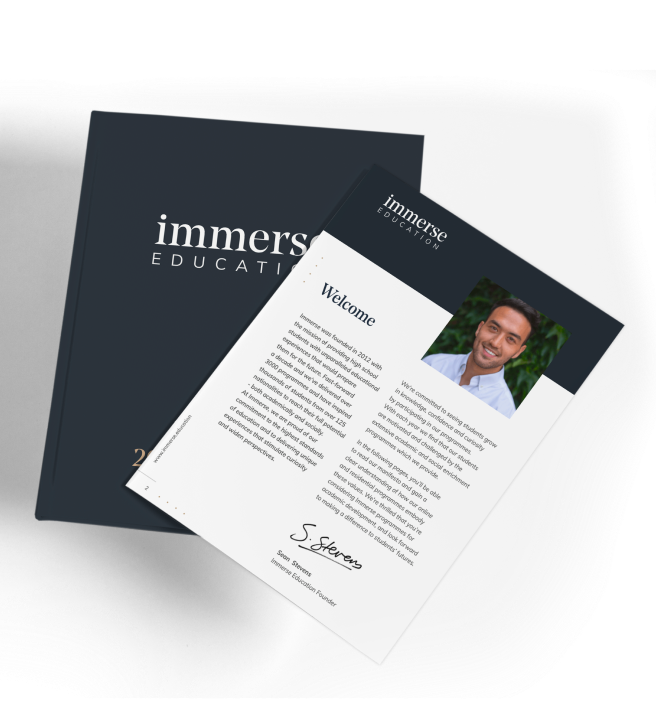
Download Our Prospectus
Let us know a little about yourself and we’ll send you a prospectus with full details of the Immerse Education Summer School offerings
- I'm a Parent
- I'm a Student
- Hidden Name * First Last
- Full Name *
- School SF ID
- Which subjects interest you? (Optional) Architecture Artificial Intelligence Banking and Finance Biology Biotechnology Business Management Chemistry Coding Computer Science Computer Science and Artificial Intelligence Creative Writing Creative Writing and Film Criminology Data Science and Analytics Earth Science Economics Encryption and Cybersecurity Engineering English Literature Entrepreneurship Fashion and Design Female Future Leaders Film Studies Fine Arts Global Society and Sustainability Health and Biotechnology History International Relations Law Marketing and Entertainment Mathematics Medicine Medicine and Health Sciences Nanotechnology Natural Sciences Philosophy Philosophy Politics and Economics Physics Psychology Software Development and AI Software Development and Gaming Veterinary Studies Online Research Programme
- Yes. See Privacy Policy.
Secure priority enrolment for our new summer school location with a small refundable deposit.
" * " indicates required fields
Receive priority enrolment for new summer school locations by registering your interest below.
Our programme consultant will contact you to talk about your options.
- Family Name *
- Phone Number
- First Name *
Would you like to receive anything else?
- Prospectuses
- Residential Syllabus Overviews (ages 13-15)
- Residential Syllabus Overviews (ages 15-18)
- Residential Syllabus Overviews (ages 16-18)
- Online Syllabus Overviews (ages 13-18)
- Immerse Education Prospectus 2024
- Career Insights - London Course Guide
- Career Insights New York
- Career Insights San Francisco
- Online Insights Prospectus
- Online Research Programme Prospectus
- Academic Insights - Cambridge & Oxford Prospectus
- Academic Insights Sydney
- Academic Insights Toronto
- Female Future Leaders
- Dates & Fees
- Architecture
- Artificial Intelligence
- Business Management
- Business Management (Sydney)
- Business Management (Career Insights)
- Computer Science
- Creative Writing
- Creative Writing (Sydney)
- Creative Writing & Film (Career Insights)
- Earth Sciences
- Engineering
- Engineering (Career Insights)
- Engineering (Sydney)
- Film Studies
- International Relations
- International Relations (Sydney)
- Medicine (Career Insights)
- Medicine (Sydney)
- Natural Sciences
- Psychology (Sydney)
- Veterinary Studies (Sydney)
- Banking & Finance (New York)
- Business Management (London)
- Data Science & Analytics (San Francisco)
- Creative Writing & Film (London)
- Entrepreneurship (San Francisco)
- Engineering (London)
- Fashion & Design (New York)
- Health Tech & Biotechnology (San Francisco)
- Marketing & Entertainment (New York)
- Medicine (London)
- Law (New York)
- Software Development & AI (San Francisco)
- Architecture & Design (Career Insights)
- Biotechnology
- Business Management (Toronto)
- Computer Science & AI (Toronto)
- Criminology
- Engineering (Toronto)
- English Literature
- Fine Art (Career Insights)
- Game Design (Career Insights)
- Law (Career Insights)
- Mathematics
- Medicine (Toronto)
- Nanotechnology
- Computer Science & AI
- Sustainability
Complete Your Request
Subject is unavailable at location.
You have selected a subject that is not available at the location that you have previously chosen.
The location filter has been reset, and you are now able to search for all the courses where we offer the subject.
How to End a Personal Statement: Writing a Conclusion

Reviewed by:
Former Admissions Committee Member, Columbia University
Reviewed: 4/26/24
When you know how to end a personal statement, you boost your chances of making a lasting impact on the admissions committee. It's all about making sure they remember you in a positive way.
Crafting a compelling personal statement is the cherry on top of your college application essay. It's that final chance to leave a lasting impression on the admissions committee, to wrap up your story with finesse, and to underscore why you're the ideal candidate for their institution.
So, let's delve into the art of writing a powerful conclusion that will make your application shine.
The Importance of a Strong Conclusion
Just like a personal statement introduction , the importance of a strong conclusion in your college application personal statement cannot be overstated. It's your last chance to leave a powerful impression on the admissions committee by summarizing your key points and reinforcing your main message.
A well-crafted conclusion offers clarity, closure, and reflection while expressing your enthusiasm for the future. It's the finishing touch that can make your personal statement truly memorable.
Defining the Purpose of a Personal Statement Conclusion
The conclusion of a personal statement plays an important role:
- Reinforces Your Core Message : It strengthens the central message or theme that runs through your personal statement, leaving a lasting impression of your candidacy.
- Recaps Key Element s: It concisely summarizes the main ideas, important experiences, and notable achievements highlighted in your essay, offering a quick reminder of your qualifications.
- Leaves an Impact : Similar to a memorable closing scene in a movie, a well-crafted conclusion can have a powerful impact. Whether through a thought-provoking question, an impactful quote, or a glimpse into your future goals, it aims to engage the reader's thoughts and emotions.
- Demonstrates Your Writing Skills : Your conclusion also shows off your writing abilities, highlighting your capacity to convey your message effectively and memorably.
The conclusion adds the final touch to your personal statement. It brings clarity, wraps things up, and encourages reflection while showing your excitement for the future. Remember, a personal statement is not a statement of purpose .
It’s all about explaining why you’re the right candidate for the program you’re applying to, rather than simply explaining why you’re applying. You need to stand out! This is your final opportunity to leave a strong impression on the admissions committee, making sure they understand why you're an exceptional applicant.
Selecting the Right Approach for Concluding
When you're reaching the end of your personal statement, it's crucial to select an approach that harmonizes with the tone and message of your essay. Take a moment to reflect on the story you've shared and the impression you aim to leave with the admissions committee.
If your personal statement has revolved around a narrative, a reflective conclusion that links back to your story can be fitting. Conversely, if your essay leans towards analysis or persuasion, you might opt to restate your main argument or emphasize the key points.
Think about what will resonate most with your reader, and make sure your conclusion seamlessly follows the flow of your preceding content. This ensures a cohesive and impactful ending to your personal statement.
Summarizing Key Points
A concise summary can be highly effective in the conclusion of your personal statement. Revisit the main points, experiences, or achievements you've shared in your essay. This summary provides a quick refresher for the reader and reinforces your most significant qualifications and attributes.
It's a way to emphasize what makes you a strong candidate without restating everything in your essay. Keep it brief and focused, highlighting the highlights that best support your application. This approach ensures that your conclusion leaves a lasting impression while staying concise and to the point.
Reiterating the Thesis or Main Message
In your personal statement, you often have a central theme or message, such as your passion for a subject, your dedication to community service , or your ability to overcome challenges. Reiterating this thesis or main message in the conclusion is valuable.
By reinforcing the importance of your central theme and explaining how it relates to your desire to be a part of the college community, you can leave a strong and lasting impression on the admissions committee. This restatement emphasizes your unique qualities and aspirations, helping your personal statement stand out.
Ending With a Thought-Provoking Question
Ending your personal statement with a thought-provoking question can engage the reader and invite them to reflect further on your essay's themes. This question should tie back to your story and message, encouraging the admissions committee to consider its implications.
However, be mindful not to make the question overly open-ended. Instead, guide the reader toward thoughtful reflection on your experiences and goals, reinforcing your candidacy effectively.
Closing With a Powerful Quote
Adding a meaningful quote to your conclusion can elevate your personal statement. Just make sure it aligns with your essay's themes and provides valuable insights. A well-picked quote connects your story to a broader perspective, making a lasting impact.
Suggesting Future Goals or Intentions
If your future goals align with the college you're applying to, your conclusion can serve as a bridge between your past experiences and your future aspirations. You can briefly mention how your journey has prepared you for what lies ahead and how you intend to contribute to the college community.
This not only demonstrates your enthusiasm but also highlights the value you'll bring to the college. Just ensure that your future intentions feel authentic and well-aligned with your personal narrative.
In a nutshell, your choice of conclusion approach can make a world of difference in how your personal statement lands with the admissions committee. The right conclusion, like the perfect closing note of a melody, can leave a lasting impression that resonates with those who read it.
Determining the Most Suitable Conclusion Approach
Keep reading for the key points on how to determine the most suitable conclusion approach for your personal statement:
- Identify Your Main Message : Begin by pinpointing your personal statement's central theme or message. What have you been trying to convey throughout your essay? This central message should guide your choice of conclusion.
- Consider Your Audience : Think about the admissions committee who will be reading your personal statement. What type of conclusion would resonate with them? Consider what qualities or values they seek in prospective students.
- Match the Style : Reflect on the style of your essay. Have you been narrating a story, reflecting on experiences, making a persuasive argument, or analyzing a topic? Your conclusion should align with the style you've used throughout your essay.
- Authenticity Is Key : Ensure that your conclusion is authentic and true to your own voice. It should reflect your genuine self and not feel forced or insincere.
- Don't Shy Away from Unconventional Approaches : Sometimes, a slightly unconventional conclusion approach can leave a more memorable impression. Don't be afraid to step out of your comfort zone if it enhances your message and connection with the reader.
- Seek Feedback : Share your conclusion approach with trusted individuals who are familiar with college applications. They can provide valuable insights into the effectiveness of your chosen approach.
- Get Support : Don't be afraid to ask for assistance if you need it. Our team of experts is here to provide personalized support in crafting your personal statement introduction, making sure it truly stands out.
Your conclusion is your final opportunity to make an impact, so choose an approach that feels right for you and effectively conveys your message to the admissions committee.
Check out our database of over 55 free college personal statement examples . It's your go-to resource for crafting a standout statement that reflects your goals and experiences. Whether you're applying for undergrad or grad school, we've got you covered with diverse examples to inspire your writing. Dive in and unleash the potential of your application!
How Long Should the Conclusion of a Personal Statement Be?
When it comes to the length of your personal statement conclusion, try to keep it around 150 to 200 words. This range strikes the right balance between wrapping up your essay effectively and leaving a memorable mark on your reader.
Remember, though, that different application platforms may have specific word limit guidelines. For instance, the Common Application allows for personal statements ranging from 250 to 650 words, while the Coalition Application suggests 500 to 650 words. QuestBridge, on the other hand, typically sticks to a 650-word limit.
So, as you craft your conclusion, always keep an eye on those word limits. Staying within them showcases your ability to convey your message concisely and demonstrates your adherence to application guidelines, which admissions committees appreciate.
It's your chance to end your personal statement on a high note, leaving a positive and lasting impression.
Tips for Personal Statement Endings
Writing an effective personal statement ending for your college application is crucial. Here are some tips to help you create a compelling and memorable conclusion:
- Reflect on Your Journey : Take a moment to think about the experiences and challenges you've faced during your academic journey. Your conclusion should connect these elements to your future aspirations.
- Revisit Your Main Message : Your personal statement likely conveys a central message about yourself. Reiterate this message in your conclusion, but do so in a way that adds depth or a new perspective to it.
- Engage Your Reader : Consider ending with a thought-provoking question or a powerful quote that relates to your essay's themes. This can stimulate the reader's thoughts and emotions and leave a lasting impression.
- Look to the Future : If applicable, hint at your future goals and how they align with the college you're applying to. This demonstrates your enthusiasm and commitment to contributing to the college community.
- Match the Tone : Ensure that your conclusion aligns with the overall tone and style of your personal statement. Whether your essay is reflective, narrative-driven, analytical, or persuasive, the conclusion should feel like a natural extension of your essay's content and style.
- Stay Concise : While your conclusion is essential, it should also be concise. Avoid introducing new information or going into extensive detail. Instead, focus on reinforcing key points and leaving a strong impression.
- Proofread and Revise : Just like the rest of your personal statement, your conclusion should be well-edited and error-free. Proofread it carefully and consider seeking feedback from teachers, mentors, or peers.
- Follow Word Limits : Adhere to any word limits provided by the application platform. Typically, a personal statement ending should be around 150-200 words, but this can vary depending on the application portal.
Remember, a conclusion is your final chance to leave a positive and lasting impression on the admissions committee. Use it wisely to showcase your strengths, uniqueness, and commitment to your academic and personal journey.
Examples of Great Personal Statement Conclusions
Now, let's take a look at some personal statement conclusion examples for inspiration.
Statement Example 1
“Our first theater meeting of the year was about a month ago. Remembering my freshman year, I brought everyone on stage. This year, I switched it up. Everyone stood in the circle for icebreakers. After each response, I asked follow-up questions and prompted others to share stories of similar experiences. And just like me, there were nervous freshmen, with little to no experience. This time, I spoke up: “Oh I’ve never heard of that show. Tell me about it sometime.”
Why This Ending Worked?
This ending worked because it circles back to the beginning, creating a sense of closure and symmetry. By recalling the initial theatre meeting and contrasting it with the present, the conclusion highlights personal growth and leadership development.
It effectively showcases the candidate's ability to engage with others, take initiative, and foster a supportive community, all of which are desirable qualities in many academic and professional settings.
Statement Example 2
“Now, I don’t let people go below what I like to call the [NAME] standard’. If I feel like someone is not treating me or my friends fairly, I don’t entertain their company.
What [NAME] did wasn’t anything extravagant. He didn’t give his kidney and he didn’t race down the 101 to save me from some terrible tragedy. However, the appreciation that [NAME] showed for me and how he vocalized who I was to him, meant all the difference to me.
Now, I always let my friends know that I appreciate them and that I am thankful to have them in my life. This gift has helped me with choosing better friends who I love and appreciate. Thanks to Ben, he’s shown me how great life is when you're not alone.”
This ending worked because it emphasizes personal growth and gratitude while also acknowledging the influence of someone significant in the candidate's life.
The conclusion adds depth and sincerity to the narrative by expressing appreciation for a friend's impact. It illustrates the candidate's values, particularly regarding friendship and integrity, and suggests how these values shape their relationships and decisions.
Statement Example 3
“I’m proud to say I can be vulnerable and act on my insecurities. I became an amicable, self-aware, and social person gaining respect and friendship amongst teachers and peers. Throughout college, I make sure to spend time with my family by cooking dinner for them once a week, sending them silly texts of cute animals, or just giving them a call. My transition to becoming more open has ultimately led to my career path as an [JOB TITLE] - creating better lives for marginalized communities. Understanding what other people go through and being susceptible will allow me to properly achieve my goals and assist those in need. It’s [YEAR], and my dad is in the best shape of his life. I show my gratitude by accompanying him during his checkups and scolding him for trying to eat poorly.”
This ending worked because it brings the narrative full circle by revisiting a key theme introduced earlier in the statement: family and vulnerability.
By sharing a specific, heartfelt moment with their father, the conclusion underscores the candidate's personal values and aspirations. It demonstrates a commitment to family and community, as well as a sense of responsibility towards others, which aligns well with their chosen career path.
Statement Example 4
“In conclusion, I am excited about the opportunity to study computer science at this university. My passion for technology, combined with my programming skills and experience, make me an ideal candidate for the program. I am eager to learn from the esteemed faculty and contribute to the research community. I am confident that this program will enable me to achieve my career goals and make a meaningful impact in the field of technology.”
This ending worked because it succinctly summarizes the candidate's motivation and qualifications while expressing enthusiasm for the opportunity.
It reiterates their passion for the field and their confidence in their abilities, leaving a positive impression on the reader. The conclusion effectively reinforces the candidate's suitability for the program and their commitment to making a meaningful contribution.
Statement Example 5
“In summary, I have always been fascinated by the human body and its functions. My experience in volunteering in hospitals, combined with my academic record, makes me confident in my ability to handle the rigours of a medical degree. I am excited about the opportunity to study at this esteemed university and to contribute to the field of medicine through research and patient care.”
This ending worked because it encapsulates the candidate's passion for medicine and their readiness for the challenges ahead. It combines their practical experience with their academic achievements, reinforcing their confidence in pursuing a medical degree.
The conclusion conveys excitement and purpose, leaving the reader with a strong sense of the candidate's dedication to their chosen profession.
Statement Example 6
“Finally, I am honoured to be considered for a law degree at this university. My passion for justice, combined with my research skills and experience, make me an ideal candidate for the program. I am excited about the opportunity to learn from the esteemed faculty and to contribute to the legal field through research and practice.”
This ending worked because it reinforces the candidate's commitment to pursuing a career in law while also expressing enthusiasm for the educational opportunity. It succinctly summarizes their qualifications and motivations, leaving a positive impression on the reader.
The conclusion highlights the candidate's passion for justice and their eagerness to contribute to the legal profession, underscoring their readiness for further study and professional growth.
Wondering how to conclude a personal statement? Let’s take a closer look by going over some commonly asked questions.
1. Is It a Good Idea to Reiterate the Main Message or Thesis Statement When Concluding a Personal Statement?
It's a smart move to recap your main message when concluding your personal statement. Reiterating your central theme creatively reinforces your uniqueness as an applicant without being repetitive, making a lasting impact on the reader.
2. Is It Acceptable to End a Personal Statement With a Question or a Quote?
Absolutely, you can conclude your personal statement with a question or quote that fits your essay's tone and message, engaging the reader and reinforcing your key points.
3. Can I Summarize the Key Points of My Personal Statement in the Conclusion?
Summarizing key points in your conclusion is a common and effective practice. Keep it short and sweet, focusing on the highlights that really support your application.
Final Thoughts
There you have it! Your personal statement's conclusion is crucial. Now that you know how to end a personal statement, you're ready to leave a strong impression on the admissions committee. Your conclusion is your final chance to convince them that you're the right candidate for the opportunity. Make it count!
Get A Free Consultation
You may also like.

How to Get Into UT Austin - Admission Requirements & Tips

Colleges that Will Require the ACT or SAT in 2024 and 2025

- How to End a Personal Statement
- Tips on How to End a Personal Statement Successfully

How to Format Your Personal Statement Correctly
5 successful ways how to end a personal statement, 5 worst ways how to end a personal statement, general tips on making a personal statement application, 5 great examples of a personal statement ending, personal statement for a medical school, personal statement for mathematics, personal statement for a law school, personal statement for a biology, personal statement for economics.
It is important to write this paper according to all requirements. With this document, you must prove that you suit the chosen position and show the admission committee or a recruiter that you are much better than all other candidates. Reading this you will learn how to end a personal statement properly.
You can create a personal statement for graduate school , a university, or any other place you want to apply to. When people create this document, they often make a big mistake when they try to write those things they think the admission committee or recruiters want to see in the ideal candidate for the position. To avoid this you can look at college application essays samples prepared by an admission essay writing service to be sure you do everything right.
You should understand there is a huge difference between this essay and an honestly written one. You need to be sincere and mention only true things about yourself. Don't try to look better than you are, just try to describe yourself brightly to be selected from tons of other applicants.
Needless to say, you have to grab the officers' or recruiters' attention, otherwise, you won't get chances to apply for a position of your dream. We suggest writing this document very carefully and thoroughly because your future depends on it. In our guide, we will give some general hints on writing and paying attention to the conclusion - it is the last part of this important paper. Go ahead and keep reading to find great tips and successful examples!
How to write personal statement ? Students need to format a personal statement just like any other kind of essay. If you want to make a strong and well-structured work, follow a three-paragraph structure:
- Introduction — in this part you have to make a catchy beginning to grab the reader's attention. You have to mention the name of the company or the course and the position or degree you are applying for.
- The body part — feel free to make several paragraphs here to support your candidacy. You have to provide readers with information about your personal experiences, characteristics, skills, goals, knowledge, achievements, etc. Don't forget to write the brightest examples from your experience to prove all the qualifications you mentioned.
- Conclusion — it is a short closing paragraph where you have to thank your audience for reading. A good idea is to put a phrase you hope to hear from them soon. You need to summarize ideas shortly and wrap up your paper properly.
When you are making the conclusion for personal statement , your goal is to concentrate on the main idea of your document. Remember you should write in the laconic style to make this part short but effective. Summarize your skills and interests shortly, include your plans for the future years, and provide information about why you fit the chosen course. Be careful with the length: your personal statement conclusion should be around ⅓ of the entire paper (150-200 words). We have one more blog that has an answer on how long is a personal statement .
The conclusion of your personal statement makes the second first impression on your audience. Use these effective hints to create a bright ending that will attract your reader:
- Include key points about the qualities you expect of yourself when you graduate from the school. Explain why you want to study. Demonstrate your interest, why you have the inspiration to learn, and why you have the enthusiasm.
- You can write a short concluding story related to your experience. Don't just describe your skills the chosen course needs, but tell how you have developed them.
- Give your readers a better understanding of how you are going to use your life experience in achieving your goals. Tell about your transferable skills — this can be leadership, good organizational skills, ability to work both independently and in a team.
- Mention that you are not afraid to use your opportunity, take new challenges and solve difficult problems. Give an explanation why you fit this course. Prove that you not only fit the selection requirements, but you have made a research to realize what this course will involve.
- Restate the main idea of your personal statement to tie all parts of your personal statement together.
These are the things you should never write in your personal statement:
- End up with a question and leave your readers in a suspense.
- Writing a number of things that are not related to the main goal.
- Providing no plans for the future and no point of view.
- Choosing courses that are not related to the particular school.
- Copyright infringement (if you are using personal statement examples from other people, make sure you do not copypaste words - their rights are reserved).
If you have no idea how to create a personal statement for college , we are ready to share some useful ideas that will help you to complete this task. Read them carefully to understand what information you need to put in this paper:
- First of all, read maximum information about the course you want to choose. Make sure you started making your personal statement beforehand so that you have enough time for writing.
- Take a sheet of paper and write down your skills, achievements, experience, activities outside of school, etc.
- Compare the list with the course description, and highlight the most relevant points.
- Make a clear plan what points you're going to include in your paper. Here you need to answer two questions: "Why did you decide to choose this course?" and "Why are you suitable to study the chosen subject?".
- Try to explain why you chose a certain school among many others. For example, if you are making a personal statement for a medical school, you have to explain to the admission committee why you are interested in medicine and why you want to choose it as your future profession.
- Don't just list your personal experiences and activities, but describe them - include in your personal statement bright examples to prove them.
- Make sure your work is structured properly. Remember the entire paper should not be too long: 500 words is enough. It's not a good idea to overdo this number, because the committee doesn't read papers that don't fit requirements.
- Try to be honest and sincere, never try to write false things because it will eventually come out. Just be yourself and don't panic.
- Don't bring any unimportant information. Never include in this paper your negative experience.
- Your audience has to feel excited from the first sentence of the personal statement. Keep in mind that boring & uninteresting papers have no chances to win.
- When your paper is finished, check every page thoroughly & correct all grammar and logical mistakes .
We want to share four successful examples that can be helpful if you feel insecure concerning how to end a personal statement correctly. Read the most successful examples to help you in writing a personal statement of your own!
I am a self-motivated & responsible person & I am looking forward to challenges. I am totally ready to solve difficult problems. I know a medical career has a lot of demands & I am sure that my desire to become a good doctor & my volunteering experience in the hospital will be very helpful.
I decided to start my career in the mathematics field because I always love my mathematics studies, so I was never in a doubt about choosing it as my future degree. I hope that my experience & my willingness to learn math will help me to make a successful career of a mathematician.
I am interested in many subject areas but lately, I turned my attention to a career in the law sphere. I can pay attention to the tiniest details; I hope this will help me to become a good lawyer. I was always good at analyzing information; I am able to find strong evidence & present persuasive arguments.
Keep in mind that there is one more blog on law school personal statement . It has a useful guide and necessary tips to help with this kind of writing.
Biology is a subject that always drew my attention. I am interested in living things & evolution, & I always work hard to find explanations of everything. I am ready for the most difficult challenges & I hope that my experience in biomedical research & my ability to gather & analyze information will help me to become a successful biologist.
Economics is a challenging subject that always attracts my attention. I understand the importance of this discipline for the entire world & I have chosen it as my future degree. I believe that my ability to achieve goals & attention to details will help me to become a good economist.
We hope you have found a lot of useful information on how to end a personal statement in our article. Good luck in writing your own document on the high level & making your own bright future! You may always refer to a professional writing agency and save your time!
If you are applying for a nursing degree at university, then you should attach a personal statement to your application and take care of its stellar content. Being one of the most important selling points in your bachelor degree application, your nursing personal statement should demonstrate that yo...
So, you have reached the stage in your life where you need to decide on your occupation. What steps do you need to take to move forward confidently? First of all, decide on the educational establishment you want to connect the next four or five years of your life with. After that, the fun part comes...
If you dream of serving your community as a dentist, you’ll need to enroll into a respective higher education program and provide certain documents to the committee. One of them is your dental school personal statement, which helps grab the interest of the admissions committee.A personal statement i...
- Admission Essay
- Statement of Purpose Editing
- Personal Statement Editing
- Recommendation Letter
- Motivation Letter
- Cover Letter
- Supplemental Essay
- Letter of Continued Interest
- Scholarship Essay
- Role Model Essay
- Our Editors
- College Admission Essay Examples
- College Cover Letter Examples
- College Personal Statement Examples
- Graduate Personal Statement Examples
- Graduate Statement of Purpose Examples
- MBA Essay Examples
- MBA Personal Statement Examples
- MBA Resume Examples
- MBA Recommendation Letter Examples
- Medical School Personal Statement Examples
- Medical School Recommendation Letter Examples
- Pricing Plans
- Public Health
- Dissertation
- Research Paper
- Thesis Editing
- Academic Editing
- Motivation letter
- Letter of Recommendation
- Personal Statement
- Statement of Purpose
How to End a Personal Statement: Strong Tips And Examples
EssayEdge > Blog > How to End a Personal Statement: Strong Tips And Examples
When everything is written down, thoughts are made up together and you see the whole picture of your essay right in front of your eyes, you may think of how to end a personal statement . It may seem to be the easiest part of writing, but, to some extent, it is not. The destiny of the conclusion is to formulate the last impression of you as a personality.
Table of Contents:
How to close a personal statement
Concluding the results of a completed job is always the most pleasing step in doing anything. Moreover, you can see with your own eyes the way you have passed to achieve your aim. The same regards personal statement conclusions. The key point of writing the conclusion is to accentuate the willingness of the applicant to receive a studying offer and get admitted to the educational institution. You have to think closely about the last paragraph in your essay. It must be the last bullet point to persuade the reader to do next-step actions further.
It may be difficult to decide what exact point you want to add at the end of the essay to complete the writing. First of all, take a break, read your essay several times, and summarize in your mind everything you have written. It is necessary to write standout sentences in your personal statement conclusion to assure the admission tutor that you are the one who is worth getting a place in the educational institution.

While writing, remember that you should concentrate on your essay’s main idea, whether it is the given topic or your personal opinion. The summary should be short and terse, but expedient. Moreover, keep in mind that you are supposed to fit into the given requirements. Your conclusion should be about ⅓ of the entire paper.
And remember to check, check, and check everything a few times.
How to end personal statement and not to fail it
While thinking about how to end personal statement, you may come up with a bunch of questions. The main one may be about what to write and not screw everything up. Here are a few examples of what you shouldn’t write in your conclusion paragraph.
- Rhetoric questions Forget about writing the statements you don’t know how to answer. This may only confuse the reader and leave them in suspense. In this way, you may only underline the point of not knowing something.
- Writing a list of your skills without proofs Even if you want to demonstrate all your skills, don’t do it without proof. Don’t waste the words for just designating the things you are able to do or the knowledge you have. It is wonderful that you have all these aspects, but the admission tutor may not understand the destiny of just naming. Try to involve them all in your main paragraph of the essay.
- Not expressing your future intensions Don’t just tell about your former personal background. It would be good to add to your personal statement conclusion some ideas on your future perspectives. Describe what you want to get out of the studying process and how you would embed it into your life and career.
- Plagiarism from successful essays It is not prohibited to use samples of successful essays just like a pattern. However, you must not copy paste as all the rights of the writer are reserved. It may only spoil your reputation and will not bring any advantages to your essay. If you feel that you need help, it is better to refer to personal statement editing rather than plagiarize.
- Writing the statements that are not related to the topic It is very good if you have a lot of stories to share. Though, you must be careful and think closely about whether the story you write about related to the main topic of your essay or not.
Need help? Check out EssayEdge editing services:
Personal statement conclusion: tips on doing such a thing
So, how to conclude a personal statement? Your conclusion should be comprehensive and impressible. Below you can find a few tips on how to write everything well.
- Take a break Really! It is worth it so to start in advance to have time to leave your writing for some time. After a break, you will read it with a new sight. Maybe you will remove something or, vice versa, add some more information. While having a break, you can think about the conclusion, you may recollect something in your mind that is worth to be written down.
- Read everything many times Yes, you may feel aversion from your essay, but remember that it is a step to your future success and that is why you have to be attentive to the details. Try to figure out the main storyline of your essay and hold it till the conclusion. Peruse everything that is already written many times and you may feel what is missing.
- Don’t be afraid to ask for help If you feel confused and don’t know how to close a personal statement, you don’t have to be scared. Everything can be resolved, remember about that. Ask your friends or parents to read your personal statement as they don’t know you. They may share with you some ideas and tell the general impression. According to that knowledge, you can easily make up your thoughts. If you are still not sure about your text, you can use personal statement editing services. Professionals will touch you up to the thought that is in need.
- Summarize everything you mentioned above Yes, it is a very useful skill if you can do a summary, no matter if it is your essay or review of achievements that you have been doing through the years. Placing the accents and underlining your best sides would be a good idea.
Personal statement conclusion examples
As it is mentioned previously, there is nothing wrong with using personal statement conclusion examples. In this way, you can find inspiration and feel more confident and secure that you move in the right way. You shouldn’t neglect using successful examples to see how it works, but in no way, you mustn’t copy paste such samples into your essay.
Here is an example of a successful personal statement ending.
To summarize everything mentioned above, I reckon that I am that one person who is worthy of getting the allowance to enter the university. The main reason for that is my strong motivation to implicate the knowledge I’m supposed to get while studying, into the life of people around the world. As I mentioned before, I have such goals and a number of gained skills. Being admitted to the university may support my intentions and help me to develop the abilities I’ve already had. Moreover, I feel that this is a place where I must improve myself. I have a lot of familiar students and their stories about studying and university life impress me every time I hear them. My plans are global and I can make them real while studying and after graduating as I will have resources and experience.
It is an example of a successful conclusion as the applicant highlighted their motivation, made an accent on the plans, and summarized the story that was told in the main paragraph. Also, this person mentioned that they have a kind of connection to the community of this university that gives an understanding that it will be easy for him to become a part of the university society.
Ending the personal statement is difficult, but the most pleasing part of the whole essay. With patience and efforts, everything can become possible. You can use examples to get inspiration. Moreover, using tips can really help you to cope with the given tasks. Remember that everything will be fine. More details on how to write personal statement you can find in the EssayEdge blog.
Popular Posts
June 2, 2022 How To Start a Scholarship Essay: Catch Reader’s Attention Fast
May 16, 2022 My Role Model Essay: A Few Ways to Elaborate on The Subject
May 3, 2022 How To Start a Personal Statement? | Writing Tips and Samples
Related Posts
June 20, 2024 UC Essay Prompts 2025
June 6, 2024 How to Conclude a College Essay?
May 28, 2024 Why AI Can’t Write Your Personal Statement (And Who Can Help)
©2024 Student Media LLC. All rights reserved.
EssayEdge: Essay Editing & Proofreading Service.
Our mission is to prepare you for academic and career success.
- Log In
- Sign Up
- Forgot password
Unable to log in? Please clear your browser's cache and then refresh this page and try again
Reset password Please enter your email address to request a password reset.

Check your email We’ve just sent a password reset link to your email.
This information is used to create your account
- +44 (0) 207 391 9037
- UCAS personal statements
- Oxbridge Personal Statements
- Specialist Personal Statements
- Postgraduate Applications
- Services for Education Agencies
- Personal Statements
- Professional
- Specialist Applications
How to Craft the Best Conclusion for Your Personal Statement
12th October 2023
Speak right now to our live team of English staff

A personal statement is a crucial component of any university application, providing the admissions committee with a snapshot of who you are as a candidate. A well-written personal statement can make all the difference in standing out among the other applicants. As important as the opening paragraph of your personal statement is, the conclusion plays an equally vital role. It’s your final chance to leave a lasting impression and convince the admissions committee that you are the right candidate for the programme. In this blog post, we will explore how to craft the best conclusion for your personal statement.
Summarise Your Main Points
A good conclusion should summarise the main points of your personal statement without simply repeating them. It’s an opportunity to remind the admissions committee of your key strengths and experiences. You can start by briefly restating your academic achievements, relevant work experience, and extracurricular activities. Highlight any skills or qualities that you have developed that make you a suitable candidate for the programme.
Reflect on Your Journey
The conclusion of your personal statement is a great place to reflect on your journey and how it has shaped you as a person. Talk about the challenges you have overcome and the lessons you have learned along the way. Show the admissions committee that you have grown as an individual and that you have a clear understanding of your goals and aspirations.
Link to the Future
Your personal statement should not only focus on your past achievements but also on your future ambitions. Use the conclusion to explain how the programme you are applying for will help you achieve your career goals. Be specific about how the programme’s curriculum, faculty, and resources will contribute to your personal and professional development.
Make a Strong Closing Statement
End your personal statement with a strong closing statement that leaves a lasting impression on the admissions committee. You can reiterate your passion for the subject and your enthusiasm for joining the programme. Avoid clichés and generic statements, and instead, try to convey your genuine excitement and commitment to pursuing your chosen field of study.
Avoid Redundancy
Your conclusion should be concise, to the point and tailored to the programme you are applying for . Avoid introducing new information or arguments that were not discussed in the main body of your personal statement. Instead, focus on summarising the key points and tying them together in a coherent and impactful way.
Leaving a Lasting Impression With Your Personal Statement
A well-written conclusion can leave a lasting impression on the admissions committee and increase your chances of being accepted into the programme. Remember to be concise, avoid redundancy, and convey your genuine passion and enthusiasm for your chosen field of study.
Need guidance on your personal statement? Get in touch today to learn more about how we can help you craft a compelling and impactful personal statement that stands out from the competition.
You may also like...

Things to Include in Your Personal Statement

Crafting Your Future: Strategies for UCAS Personal Statements

Personal Statement Key Elements Every Applicant Should Know
Personal Statement Advice
How to perfectly end a personal statement: make an impression & land the job.
By Will Etheridge - 05 June 2023
Ready to take your career to the next level?
CV Wallet is the world's first career management app. Our suite of tools is built to make finding your dream job faster and easier.

Have you ever found yourself asking, "How do I end a personal statement for a job?" If yes, then this comprehensive guide is for you.
We’ll reveal the secret to writing a compelling ending for your personal statement that will leave a lasting impression on employers. Moreover, we'll introduce you to CV Wallet, the world's first career management app, to help streamline your job-seeking process.
Understanding Personal Statements
First things first, what is a personal statement? Essentially, a personal statement is a short, reflective essay you write about yourself. It’s an opportunity to showcase your skills, experience, and aspirations to potential employers.
A well-crafted personal statement can set you apart from other candidates, thereby landing you that much-desired interview call.
A personal statement has three key parts: the opening, body, and ending. Each part is integral, but the closing, often underestimated, plays a pivotal role.
It's your final chance to create a lasting impression, and that's why understanding how to end a personal statement compellingly can make a significant difference.
The Anatomy of a Strong Conclusion in Personal Statements
So, what makes a strong ending to a personal statement? There are several key ingredients:
- Relevance: A strong ending directly aligns with the role for which you're applying. It bridges the gap between your skills, experience, and the job requirements, painting a picture of you as the ideal candidate.
- Reflection: The best endings don't just summarise but reflect on your experiences, showcasing how they shaped you as a professional and how they will help you excel in the prospective job role.
- Future Aspirations: A well-crafted conclusion often hints at your future aspirations within the role, demonstrating enthusiasm and commitment to your career path.
- Call to Action: It may be subtle, but a nudge suggesting what you want to happen next - a call, an interview, or an opportunity to discuss further - can make a big difference.
Step-by-step Guide on How to End a Personal Statement
Now, let's break down the process of writing a compelling conclusion for your personal statement. Follow this step-by-step guide to create an ending that leaves a strong impression.
Step 1: Reiterate Your Enthusiasm
Reiterate your enthusiasm for the role. Remind the reader about the unique qualities and experiences that make you an ideal fit. However, avoid repeating statements verbatim from the opening or body of your personal statement.
Step 2: Reflect on Your Experiences
Reflect on your journey, highlighting experiences that uniquely qualify you for the role. Show how your past experiences have equipped you with essential skills and how you intend to leverage them in the future role.
Step 3: Express Your Future Aspirations
Share your career aspirations, giving an insight into how the role aligns with your professional trajectory. Show how you envision growing and contributing to the organisation.
Step 4: Propose a Follow-up
End with a subtle call to action, expressing your eagerness to discuss your candidacy further.
These steps are a roadmap to writing an engaging and compelling conclusion for your personal statement. However, remember to tailor it to each specific job application, as a generic ending can dilute your statement's impact.
Common Mistakes to Avoid When Ending a Personal Statement
Crafting a powerful conclusion for your personal statement is just one side of the coin. It's equally important to avoid common pitfalls that could undermine your efforts. Here are a few mistakes to steer clear of:
- Repetition: Avoid rehashing points already made in the statement. The conclusion should be reflective, not repetitive.
- Irrelevance: Stay on point and keep your conclusion relevant to the job role and your personal experiences.
- Being Generic: A generic or templated conclusion can make your statement seem insincere. Tailor your ending to the specific role.
- Negativity or Arrogance: Maintain a confident yet humble tone. Avoid coming across as either overconfident or under-confident.
How to Tailor the End of Personal Statements for Different Jobs
Your personal statement and its conclusion should be as unique as the job you're applying for. Here are some tips on how to tailor your statement's ending for different job roles:
- Research the Role: Understand the role's requirements, the company's culture, and values. Tailor your conclusion to highlight how you fit into this picture.
- Emphasise Relevant Skills: Highlight the skills and experiences most relevant to the role in your conclusion.
- Speak Their Language: Use industry-related keywords and jargon, showing you're familiar with the field.
- Align Your Goals: Show how your career goals align with the role and the company's vision.
Using CV Wallet to Enhance Your Job Application
Now that you're equipped with the knowledge of how to end a personal statement compellingly, let's talk about how the CV Wallet app can further strengthen your job application.
CV Wallet is a revolutionary tool offering a suite of smart tools to help job seekers. It automates job applications, verifies your skills and qualifications using Blockchain technology, provides AI-powered support for career advice, and more.
It can assist you in crafting an impactful personal statement, offering resources and guidance to ensure your application stands out. The best part? It's free and always will be!
Ending a personal statement with impact is your final chance to leave a lasting impression on the employer. A well-crafted conclusion can be the deciding factor in whether you get a call back for an interview.
Remember, the conclusion is your stage to wrap up your story coherently, reflect on your experiences, and express your enthusiasm for the role. Avoid common pitfalls, tailor your ending to the specific role, and use tools like CV Wallet to perfect your job application.
Mastering the art of how to close a personal statement effectively is indeed a game-changer. Implement these strategies, and you're one step closer to landing your dream job. Good luck with your career journey!

Share and tag us!

Professionals
How to Write a Strong Conclusion to Your Personal Statement

Written by David Lombardino | Updated February 23, 2024
Hook Them Through to the End
You can hook your reader with the introduction to your personal statement . And you can wow them with magical words in your personal statement . But if you don’t write a strong conclusion to your personal statement? You’ll leave program directors and admission committees with a whimper, rather than a bang.
The conclusion forms a critical part of your personal statement. Program directors and admission committees may skip to it after reading your introduction. Or they may start with it, even before reading your introduction.
The reason they do this? To get through the many applications they have to review each cycle.
Good conclusions will deliver the points admission committees expect to see. And great conclusions will enhance their views of you as an applicant.
Here, I present how to write a great conclusion to your personal statement.
Where Does This Advice Come From?
It comes from my 8 years as an editor at UNESCO prior to founding DLA back in 2008 . It comes from interviews I've had with program directors and those who serve on admission committees. And it comes from 15+ years of helping applicants like you write outstanding personal statements .
3 Key Concepts and a Formula for Success
How do you write a conclusion in a personal statement? It starts with these three concepts:
- Avoid stating it is your conclusion;
- Avoid introducing an unsupported concept; and
- Be specific in the details.
First, I will discuss these three key concepts in detail. Then I will share my foolproof method for how to write a personal statement conclusion.
Key #1: Avoid Stating It Is Your Conclusion
A thought you may have is to start your conclusion with “In conclusion.” Or “In summary.” You want to make sure to avoid this, or anything similar.
Why is this? Program directors and admission committees see it's your last paragraph. In other words, they already know it's your conclusion. So make your personal statement great by leaving this out.
Simply, using extra words makes your writing less engaging. Wordiness can indicate a lack of diligence or maturity. It can indicate a lack of focus or clarity. And it can indicate self-doubt in what you are writing.
This is true, no matter where it may occur in your personal statement.
Key #2: Avoid Introducing an Unsupported Concept
Great conclusions advance the concepts of your personal statement. This means avoiding introducing an unsupported idea. Instead, make sure all ideas connect back to what you have written earlier.
Let's say, for example, you haven't yet discussed your love of teaching. And teaching is important to your future career. You'll certainly want to include it in your conclusion. So just make sure you've written about it earlier in your personal statement. That way, it won't come out of nowhere when writing about it in your conclusion.
If you write a new, unsupported idea in your conclusion, you may convey:
- You do not know how to effectively organize your personal statement;
- You are trying to cram too many ideas into your personal statement; or
- You are ticking off a checklist of what to say.

There are a couple of exceptions to this point. Are you an older candidate? Do you have multiple significant items you need to discuss? There may simply be not enough room for all these in the body paragraphs. In this case, your only option may be to present one in the conclusion.
In such cases, there are a few guidelines to follow. First is you must fully develop the new idea in your conclusion. You must do more than simply mention it.
Second, it must extend from a point made earlier in the personal statement. It must have a foundation.
Finally, it must dovetail seamlessly with the rest of the conclusion. And it must do so without the conclusion becoming too long. (This can be challenging, so don't be afraid to ask for help.)

Key #3: Be Specific in the Details
Key to writing a great personal statement is being specific . This means being specific both in the words you use (e.g., avoiding using “thing”) and in the details you write.
Many candidates make the mistake of being vague in the conclusion. This relates especially to what you wish to accomplish in the program. You may want to write to "increase my knowledge." Or you may want to write to "gain exposure in a variety of settings."
Can you make these more specific, so they can be more effective for you? For example, in what specific areas do you wish to increase your knowledge? What specific settings do you want to gain exposure to?
Any ways you can be more specific will make your conclusion stronger.
Formula for a Great Conclusion to Your Personal Statement
The formula I present here takes you step by step through writing your conclusion. It includes how to start the conclusion to your personal statement. It includes how to end it. And it includes how long your personal statement conclusion should be.
While the formula makes a logical progression, feel free to change it up. If you find another order works better for you, then go for it. Just make sure you have covered each item in your conclusion.
How Long Should the Conclusion to a Personal Statement Be?
Part 1: start with your vision for your future career.
The key to a great conclusion is in how you start. Start with your vision for your future career. This is a single sentence stating where you see yourself 5 to 10 years from now. Think of your vision as your conclusion's thesis statement.
The vision can be your medium-term goals, your long-term goals or both. Choose whichever option brings a better focus and context for your conclusion.
For example, you may wish to pursue cardiology fellowship after internal medicine residency.
Or you may wish, after law school, to enter private practice with time devoted to pro bono work.
But what if these goals change as you progress through the program? That's okay. You don't have to get them exactly right in your personal statement. And you don't have to stick to them just because you mentioned them.
The aim here is to demonstrate a clear vision for the path you are on. Being intentional will make your application stand out.

Part 2: Next, State Precisely What You Seek to Accomplish in the Program
After establishing your medium- and long-term goals, work backward from there. Perform a self-assessment. What precisely do you need to accomplish next? What next step will better position you to achieve your career vision?
The more specific you can be with these answers, the better. Then frame these as what precisely you seek to accomplish in the program.
For example, will you aim to apply for a cardiology fellowship? Then pursuing cardiology electives would be a goal for internal medicine residency.
What about for applying to law school? Is your long-term goal to practice in an area with litigation? Then a goal for law school would be to participate in mock trial.
Part 3: Then, Therefore, State the Specific Aspects You Are Seeking in a Program
First, you established your vision. Then you identified the next step to take toward achieving that vision. Now state which aspects would equip you to achieve that next step.
Does the program have a high rate of case types that align with your interests? Does it offer certain relevant technologies? Training in certain techniques? Particular courses or electives ?
Are there particular faculty whose research interests fascinate you?
What about elective rotations? Or partnerships available in the program?
Do they offer an elective rotation in a cath lab? That would be great for someone wanting a career in cardiology. What about a renown mock trial program? That would be great for a career in litigation.
And you can go further. Are you an aspiring Vietnamese doctor or lawyer? Do you want to work with Vietnamese immigrants? Does the program you are applying to serve such a population? Then mention that.
| |
Geographic and Other Ties to the Program
Do you have geographic or other ties to the program? For example, do you have family or close friends in the area? Do you have colleagues who graduated from the program where you are applying? Great! This is where you would mention them.
This applies even if you are applying for medical residency and are specifying geographic and other preferences in your ERAS Application .
For each of your top-choice program(s), write a different version of your conclusion. Tailor it to each program.
Then group all the other programs by common features (e.g., geography). Make sure to be as specific as possible when doing so. Then tailor a different version of your conclusion for each group of programs.
Part 4: Finally, State What You Offer to the Program
Have you accomplished the above three points? Great! All that's left is to state what you offer to the program.
This is actually quite easy. Start by identifying the themes you have written in your personal statement. Check your introduction and each body paragraph. Then list these themes, in keyword form, as what you offer to the program.
In this way, you accomplish two goals. First is to wrap up your personal statement's main points. Second is to provide a forward-looking statement as you bring it to an end.
This website uses cookies to improve user experience. By using our website you consent to all cookies in accordance with our Cookie Policy .
Get university advice on The Student Room app
- Teacher training
- Bangor University
- Birmingham City University
- Sheffield Hallam University
- University of Aberdeen
- University of East Anglia
- University of Hull
- University of Kent
- University of Reading
- A-level choices
- GCSE choices and university
- Choosing a course
- Making firm and insurance choices
- University open days
- Top questions to ask at a university open day
- Ucas Extra explained
- Understanding conditional offers
- University offers: what they mean and what to do next
- Getting the most from Ucas university fairs
- What do I need to get into Oxbridge?
- What to do if you don’t get an offer from your first choice university
- What you need to know about getting a university scholarship, grant or bursary
- AS and A-levels explained
- Is a higher or degree apprenticeship right for you?
- Universities
By Nik Taylor (Editor, The Uni Guide) | 19 October 2023 | 4 min read
Finished! University experts on how to end your personal statement
Got writer's block at the final hurdle? We spoke to university experts to find out how you can close your personal statement with a flourish
Share this page
Email & print.

You've got the beginning and middle parts of your personal statement sorted – but how are you going to finish it? And does the ending even really matter? Short answer: yes, it does. Your personal statement is your one chance to speak directly to the universities where you're applying - and the ending is where you can leave them with the right impression. “A strong conclusion is essential to leave no doubt in the reader's mind that you deserve an offer," says Bangor University’s Emma Harris. To help you sign off your personal statement in style, we spoke to experts from universities across the UK. Here, they share essential tips on concluding your personal statement.
1. Is your personal statement ready to be finished?
Your conclusion is where you can bring together all the key points from the rest of your personal statement. But before you can write a summary like that, you need to make sure nothing's missing. "A strong conclusion gives a roundup of the evidence a student has given in their statement to show how their knowledge, skills and experiences will enable them to come to university and not only want to learn more but also want to succeed in the future," says Laura Knight, education liaison officer at Staffordshire University . So have a read through what you've already written and ask yourself: do you have all those elements covered? If your ending is proving tricky to write, it may be that you haven't yet got everything you need in the main statement.
- Read more: how to write an excellent personal statement in 10 steps
2. Share your motivation
Once you're confident you've included all the essentials, you can focus your conclusion on connecting these key points. This closing chunk of your statement is a space where you can really emphasise your qualities. It's where you can show why you want to commit your time and energy to studying this course. "You will have a reason for applying to university and to your particular course," says Ian Freedman, student recruitment officer at Keele University . "The conclusion offers a great opportunity for you to reiterate what this reason is." "Summarise what you are most looking forward to about studying at university [and] why you feel that this is the right course choice for you," says Kirsty Wilkinson, school and college liaison manager at Loughborough University .
- More like this: universities reveal all about personal statements
3. Don’t waffle
You've written a great personal statement so far; don't close it off with a load of meaningless waffle. Keep up the momentum by "using your conclusion to reinforce your commitment to the course you’ve chosen" says Pat Watson, head of UK and EU admissions at Anglia Ruskin University . "Keeping this short and concise is better than long and vague."
Rosie Reynolds, outreach officer at the University of Westminster , agrees. "You should use this section to clarify to the admissions tutor that you meet the criteria they are looking for."
Be careful not to waste this space by adding unecessary additional personal information. "Keep it simple, concise and relevant!" says Gavin May, student recruitment assistant at St George's, University of London .
- More like this: how to write your university application
4. Make it clear why you’ll be an asset to the university
What better way to finish than by spelling out exactly why you'll be such a great student? Well, for many people, talking about yourself with confidence is actually one of the hardest aspects of writing a personal statement. But now's not the time to be shy. "End with a statement about why the universities would benefit from having you as a student," says Hannah Robinson, outreach officer at the University of East Anglia . "Share how you’ll make the most of your uni experience and how you’re looking forward to the challenge."
When you're doing this, think beyond the academic, says Shona Barrie from Heriot-Watt University . "Tell us why you will be an asset to our university community. So it's not just about getting a degree – it's about appreciating the bigger picture."
- More like this: the ten biggest mistakes when writing your personal statement
5. Explain how university fits into your life plan
You could use your conclusion to look to the future, explaining exactly where you want to end up and how this particular course will help you get there. "Present your long-term plans and how your chosen course will help you to achieve this," suggests Ann Partington, senior admissions officer at UCLan .
Kimberley Ashwell, admissions officer at Buckinghamshire New University adds that providing some information on "what you imagine yourself doing after you complete your degree" will help the admissions team to picture how you’ll fit at the university.
Then, "once you've drawn together your motivations for further study, your current studies and career ambitions, deliver a strong, final line about why you deserve an offer" concludes James Aitken, schools and colleges liaison manager at Royal Holloway .
- More like this: five practical tips to help with your personal statement
And finally...get some back-up
For answers to any questions about writing your personal statement, you can ask the personal statement experts on The Student Room .
You can also take inspiration from The Student Room's personal statement library and find discussion about each university in the UK .
You may want to look at these...
How to write an excellent personal statement in 10 steps.
Help and advice on putting your application together
How to write your personal statement when you have nothing interesting to say
Hit the wall with your personal statement? Get back on track with these quick tips from admissions experts
Will Ucas scrap personal statements?
The uni application process is changing, but personal statements will not be affected until autumn 2025 at the earliest
Related to this article
Search the uni guide, find further advice or search for information on a course or university.
- Search Advice
- Search courses &/or universities
The Uni Guide and The Student Room are both part of The Student Room Group.
Promoted universities
- Durham University
- Lancaster University
- University of Glasgow
- University of the Arts London
- University of Southampton
- Aston University, Birmingham
- Swansea University
- Ulster University
- Cardiff University
Browse expert advice
- Oxbridge applications
- Ucas application
- Personal statements
- Ucas deadline 2024 countdown
- Clearing and results day
- Preparing for university
- Student accommodation
- Student life
- Student finance
- Advice for parents
About this site
- Cookie policy
- List of universities and colleges
- Privacy notice
- Terms and conditions
- Where we get our info
Who we work with
- Your account settings
Ad privacy settings
Popular tools and features
- A-level Explorer
- Course search

Connect with us

not just any cv company – we wrote the book

PS Tip 60 : How to end a personal statement
Before i discuss how to end a personal statement, i’d like to cover what you shouldn’t do. under no circumstances should you simply repeat everything you’ve already said in shorter form – it doesn’t add to the statement, it simply wastes space. with that out of the way, i’ll cover my own personal method, which i use fairly frequently (although by no means always – i did say i take a flexible approach). you’ve already planned your personal statement, so hopefully you know which aspects you’ll be addressing last. usually this will be an important element, as it’s a perfect opportunity to go out with a bang. rather than writing a specific ‘conclusion’ paragraph, i like to hit the reader with a few powerful achievements related to the point i’m covering, and then wind up the statement as soon as possible afterwards. a graceful way to do this is often to leave something you’re truly excited about for the last paragraph, and after your big achievements to simply explain that it’s an exciting prospect for you and that you look forward to getting started if successful with your application. this may seem abrupt, but it negates the chances of boring your reader with a conclusion, and leaves them with a final memory of your biggest achievements. don’t forget that there’s no reason to follow a traditional ‘story format’ unless it helps you to achieve your goals – we’ve had a lot of success by writing statements that get straight to the point, and don’t mess around at the close..




.webp)

.webp)





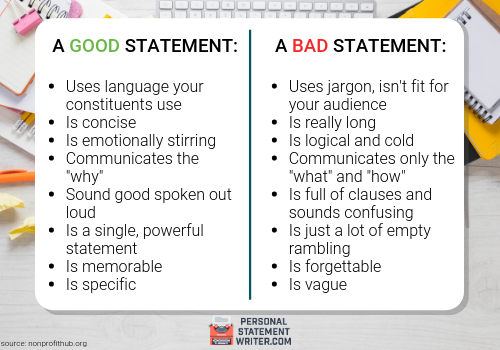
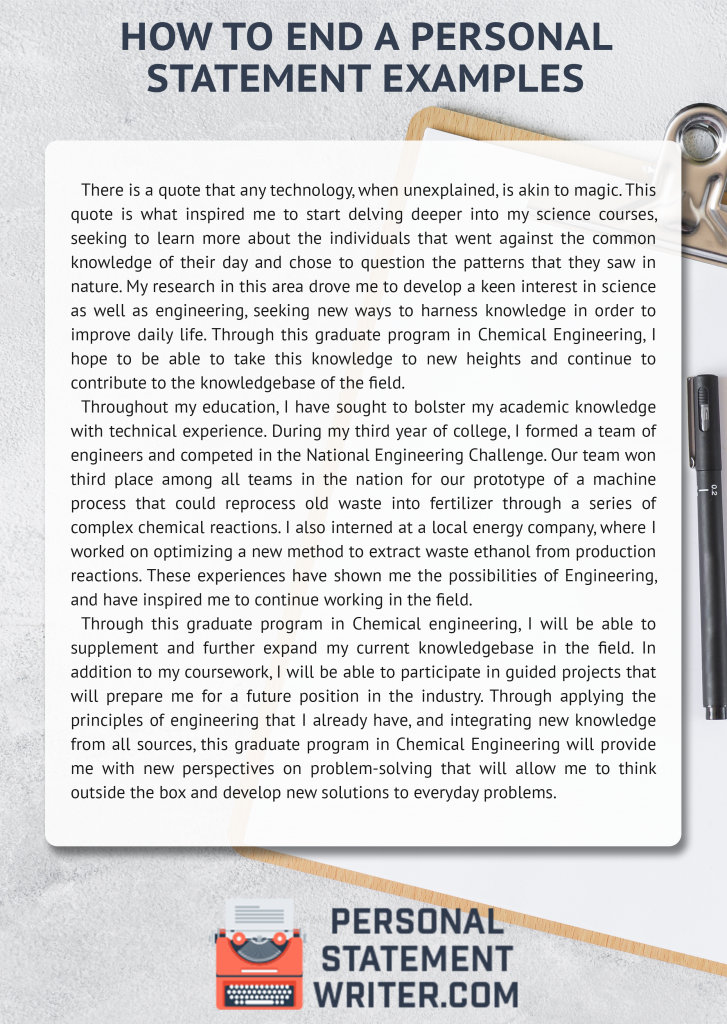
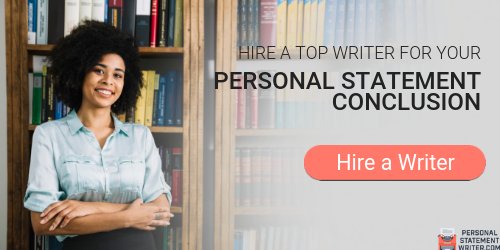
IMAGES
VIDEO
COMMENTS
A personal statement conclusion should be 150-200 words long and leave a positive lasting impression on the reader. A UCAS personal statement should be 4000 characters long, making the conclusion 705-940 characters long - this is just a rough estimation based on the average number of characters per word (4.7).
When considering how to end a personal statement, don't summarize existing content in a repetitive conclusion. Instead, clarify your suitability with a new example and evidence your value to the institution. Lastly, outline your ambitions in relation to the opportunities presented by the course. I've broken down each of these elements in ...
Defining the Purpose of a Personal Statement Conclusion. The conclusion of a personal statement plays an important role: Reinforces Your Core Message: It strengthens the central message or theme that runs through your personal statement, leaving a lasting impression of your candidacy.; Recaps Key Elements: It concisely summarizes the main ideas, important experiences, and notable achievements ...
5 Worst Ways How to End a Personal Statement. These are the things you should never write in your personal statement: End up with a question and leave your readers in a suspense. Writing a number of things that are not related to the main goal. Providing no plans for the future and no point of view.
A great conclusion can be an essay-maker. It can take your personal statement from "pretty good" to "outstanding" This post will show you how. So let's. Talk. Endings. By the way: I'm using the term "we" instead of "I" here because I co-wrote this piece with my long-time friend, Andy Simpson.
Tie it back to what you've written earlier. Revisit the key points you've already spoken about in the main body of your personal statement and emphasise them again in your conclusion. This could be reiterating key skills, interests, and experiences you've already touched on, giving them one last chance to hit home (but don't just ...
Do not try to overload the conclusion with long and wordy sentences. Also, avoid repeating the same issues discussed in the body paragraph. So, 3-4 sentences will be enough to highlight your main strong points to stand out from the rest. ... Placing the accents and underlining your best sides would be a good idea. Personal statement conclusion ...
Avoid Redundancy. Your conclusion should be concise, to the point and tailored to the programme you are applying for. Avoid introducing new information or arguments that were not discussed in the main body of your personal statement. Instead, focus on summarising the key points and tying them together in a coherent and impactful way.
Follow this step-by-step guide to create an ending that leaves a strong impression. Step 1: Reiterate Your Enthusiasm. Reiterate your enthusiasm for the role. Remind the reader about the unique qualities and experiences that make you an ideal fit. However, avoid repeating statements verbatim from the opening or body of your personal statement.
Key #3: Be Specific in the Details. Key to writing a great personal statement is being specific. This means being specific both in the words you use (e.g., avoiding using "thing") and in the details you write. Many candidates make the mistake of being vague in the conclusion.
If your ending is proving tricky to write, it may be that you haven't yet got everything you need in the main statement. Read more: how to write an excellent personal statement in 10 steps. 2. Share your motivation. Once you're confident you've included all the essentials, you can focus your conclusion on connecting these key points.
How to Write a personal statement A Comprehensive Video Course for Students. A seven-part online course designed to gives students and counselors everything they need to figure out (or help someone else figure out) how to write a personal statement for the Common App. Watch the Q&A sessions after each session where I answer important questions about the personal statement-writing process and ...
PS Tip 60 : How to end a personal statement. Before I discuss how to end a personal statement, I'd like to cover what you shouldn't do. Under no circumstances should you simply repeat everything you've already said in shorter form - It doesn't add to the statement, it simply wastes space. With that out of the way, I'll cover my own ...
It's not coincidental that the closing sentences of your personal statement essay should also leave the reader with a final burnished image. In the best case, you tie together your narrative with mature reflection. Therein lies the impact of your writing. Your College Application Personal Statement Chapter 5: The Closing Paragraph.
So far your UCAS personal statement should bring the events in your life to the current moment. Please see below for an example ending: "I have the skills and determination to succeed on this course. After six months working as an assistant editor I knew I wanted to train to be a journalist. This course will fulfill my dreams".
Personal statement sentence starters fall into three specific categories. Introductions, comparisons and conclusions are effective ways to start paragraphs. Use connections, additions and relationships when developing content. Starters relating to the presentation of ideas work well throughout. From sixth-form personal statement sentence ...
Here are some examples of personal and professional statements: 1. Personal statement for a postgraduate programme. Joan David Personal statement for master's programme in Public Policy and Administration London School of Policy 'I held my first textbook when I was a 23-year-old undergraduate.
Top tips on how to write your statement opener. We spoke to admissions tutors at unis and colleges - read on for their tips. 1. Don't begin with the overkill opening. Try not to overthink the opening sentence. You need to engage the reader with your relevant thoughts and ideas, but not go overboard. Tutors said: 'The opening is your chance ...
If you're looking for good conclusion starters to finish your piece strongly, look no further. ... Review some examples of good conclusion sentence starters so you'll be able to craft appropriate endings of your own. ... or you may even get assigned to write an informal essay that calls for more of a personal touch than an academic tone.
Simply repeat your thesis word-for-word. This lacks originality and doesn't offer a fresh perspective. Summarize your key points concisely. 📝 Briefly revisit the main arguments used to support your thesis. Rehash every detail from your essay. 🔍 Focus on a high-level overview to reinforce your essay's main points.
I am enthusiastic about the prospect of bringing my skills and experience to your dynamic organization. 23. I am eager to apply my expertise to help drive innovation and success in this role. I would be thrilled to join your team. 24. I am confident my abilities make me a strong candidate for this opportunity.
2. Framing. Leaving your personal essay without a proper conclusion is a bad trend. It makes the reader reread the whole text in order to remember it, and a conclusion gives it a sort of frame that structures the content and makes it easier to navigate. 3. Topics closure.